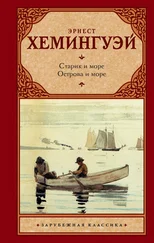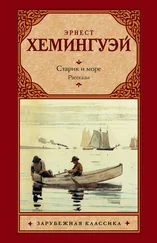| Do not think about sin. |
Нечего раздумывать над тем, что грешно, а что не грешно. |
| It is much too late for that and there are people who are paid to do it. |
Сейчас уже об этом поздно думать, да к тому же пусть грехами занимаются те, кому за это платят. |
| Let them think about it. |
Пусть они раздумывают о том, что такое грех. |
| You were born to be a fisherman as the fish was born to be a fish. |
Ты родился, чтобы стать рыбаком, как рыба родилась, чтобы быть рыбой. |
| San Pedro was a fisherman as was the father of the great DiMaggio. |
Святой Петр тоже был рыбаком, так же как и отец великого Ди Маджио". |
| But he liked to think about all things that he was involved in and since there was nothing to read and he did not have a radio, he thought much and he kept on thinking about sin. |
Но он любил поразмыслить обо всем, что его окружало, и так как ему нечего было читать и у него не было радио, он много думал, в том числе и о грехе. |
| You did not kill the fish only to keep alive and to sell for food, he thought. |
"Ты убил рыбу не только для того, чтобы продать ее другим и поддержать свою жизнь, - думал он. |
| You killed him for pride and because you are a fisherman. |
- Ты убил ее из гордости и потому, что ты - рыбак. |
| You loved him when he was alive and you loved him after. |
Ты любил эту рыбу, пока она жила, и сейчас любишь. |
| If you love him, it is not a sin to kill him. |
Если кого-нибудь любишь, его не грешно убить. |
| Or is it more? |
А может быть, наоборот, еще более грешно?" |
| ''You think too much, old man,'' he said aloud. |
- Ты слишком много думаешь, старик, - сказал он вслух. |
| But you enjoyed killing the dentuso, he thought. |
"Но ты с удовольствием убивал dentuso, - подумал старик. |
| He lives on the live fish as you do. |
- А она, как и ты, кормится, убивая рыбу. |
| He is not a scavenger nor just a moving appetite as some sharks are. |
Она не просто пожирает падаль и не просто ненасытная утроба, как многие другие акулы. |
| He is beautiful and noble and knows no fear of anything. |
Она - красивое и благородное животное, которое не знает, что такое страх". |
| ''I killed him in self-defense,'' the old man said aloud. ''And I killed him well.'' |
- Я убил ее, защищая свою жизнь, - сказал старик вслух. - И я убил ее мастерски. |
| Besides, he thought, everything kills everything else in some way. |
"К тому же, - подумал он, - все так или иначе убивают кого-нибудь или что-нибудь. |
| Fishing kills me exactly as it keeps me alive. |
Рыбная ловля убивает меня точно так же, как и не дает мне умереть. |
| The boy keeps me alive, he thought. |
Мальчик - вот кто не дает мне умереть. |
| I must not deceive myself too much. |
Не обольщайся, старик". |
| He leaned over the side and pulled loose a piece of the meat of the fish where the shark had cut him. |
Он перегнулся через борт и оторвал от рыбы кусок мяса в том месте, где ее разгрызла акула. |
| He chewed it and noted its quality and its good taste. |
Он пожевал мясо, оценивая его качество и вкус. |
| It was firm and juicy, like meat, but it was not red. |
Мясо было твердое и сочное, как говядина, хоть и не красное. |
| There was no stringiness in it and he knew that it would bring the highest price In the market. |
Оно не было волокнистым, и старик знал, что за него дадут на рынке самую высокую цену. |
| But there was no way to keep its scent out of the water and the old man knew that a very had time was coming. |
Но его запах уносило с собой море, и старик не мог этому помешать. Он понимал, что ему придется нелегко. |
| The breeze was steady. It had backed a little further into the north-east and he knew that meant that it would not fall off. |
Ветер не ослабевал; он слегка отклонился дальше на северо-восток, и это означало, что он не прекратится. |
| The old man looked ahead of him but he could see no sails nor could he see the hull nor the smoke of any ship. |
Старик смотрел вдаль, но не видел ни парусов, ни дымка или корпуса какого-нибудь судна. |
| There were only the flying fish that went up from his bow sailing away to either side and the yellow patches of Gulf weed. |
Только летучие рыбы поднимались из моря и разлетались в обе стороны от носа его лодки да желтели островки водорослей. |
| He could not even see a bird. |
Не было даже птиц. |
| He had sailed for two hours, resting in the stern and sometimes chewing a bit of the meat from the marlin, trying to rest and to be strong, when he saw the first of the two sharks. |
Он плыл уже два часа, полулежа на корме, пожевывая рыбье мясо и стараясь поскорее набраться сил и отдохнуть, когда заметил первую из двух акул. |
| ''Ay,'' he said aloud. There is no translation for this word and perhaps it is just a noise such as a man might make, involuntarily, feeling the nail go through his hands and into the wood. |
- Ай! - произнес старик слово, не имеющее смысла, скорее звук, который невольно издает человек, чувствуя, как гвоздь, пронзив его ладонь, входит в дерево. |
| ' 'Galanos,'' he said aloud. |
- Galanos, - сказал он вслух. |
| He had seen the second fin now coming up behind the first and had identified them as shovel-nosed sharks by the brown, triangular fin and the sweeping movements of the tail. |
Он увидел, как за первым плавником из воды показался другой, и по этим коричневым треугольным плавникам, так же как и по размашистому движению хвоста, понял, что это широконосые акулы. |
| They had the scent and were excited and in the stupidity of their great hunger they were losing and finding the scent in their excitement. |
Они почуяли запах рыбы, взволновались и, совсем одурев от голода, то теряли, то вновь находили этот заманчивый запах. |
| But they were closing all the time. |
Но они с каждой минутой приближались. |
| The old man made the sheet fast and jammed the tiller. |
Старик намертво закрепил шкот и заклинил руль. |
| Then he took up the oar with the knife lashed to it. |
Потом он поднял весло с привязанным к нему ножом. |
| He lifted it as lightly as he could because his hands rebelled at the pain. |
Он поднял весло совсем легонько, потому что руки его нестерпимо болели. |
| Then he opened and closed them on it lightly to loosen them. |
Он сжимал и разжимал пальцы, чтобы хоть немножко их размять. |




